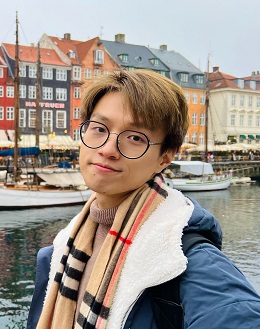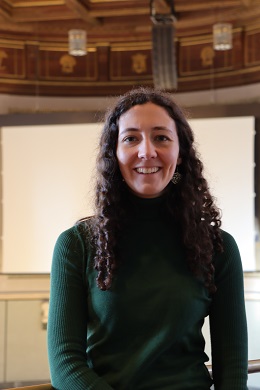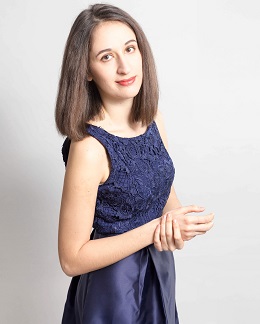Here’s what participants say
Zengqihan

What are you studying, and why did you apply for the ICCP?
I’m studying for a master’s degree in German literature. For my bachelor’s degree, I studied German studies abroad. That includes for example literature, linguistics or also intercultural communication. Through that, I had already developed an interest in this area. A classmate told me about the ICCP, which she’d already completed.
What do you plan to do with the knowledge you’ve gained through the ICCP?
I study the humanities. There are lots of career paths there. I’d like to try out different things, but for example, I can imagine working in Human Resources. This expertise can definitely help me there.
What content in the ICCP has been the most valuable to you so far?
I think for example the theories about High Context and Low Context Cultures to be very interesting. Theories don’t always cover all aspects, but they give us an orientation for how we can communicate better with different cultures, and that is very important. Another topic is dealing with foreigners. I myself am a foreigner in Germany. How I can integrate myself better in Germany and how one can give foreigners a good life is generally relevant for society and of course also for me personally.
To what extent would you be interested in a master’s in Intercultural Communication?
At the moment I’m considering whether I can add the master’s in Intercultural Communication as a second degree. Maybe I can get a few ECTS credits. I’m very interested in the master’s degree!
Teresa

What do you study, and what was the deciding factor in why you applied for the ICCP?
I’m studying Philosophy for a bachelor’s degree with a minor in SLK (“language, literature, culture”). I’ve already written the bachelor thesis, and now I’m taking time to take additional courses. Furthermore, Philosophy is quite abstract, which is why I wanted to do something empirically based. That’s why I looked up additional courses on the LMU website and came across the ICCP. That spoke to me because I believe that Intercultural Communication is important in all situations and all areas of life. Also, many of the subfields in Intercultural Communication intersect with Philosophy.
What do you plan to do with the knowledge you’ve gained through the ICCP?
I think that this will enable me to better follow the social debates, for example, those about post-colonialism, racism or intersectionality. In addition, I hope I can apply the expertise I’ve gained from the programme later on in my job and more competently handle intercultural situations. I also believe that, no matter what profession, you can put this to good use.
What content in the ICCP has been the most valuable to you so far?
The discussions about racism have stayed with me very strongly. That is a topic I’ve always been interested in, but until now I never really had a theoretical basis. Related to that, we read a text in which the author says that he doesn’t call himself “not racist,” but rather just “less racist,” because you can’t completely detach yourself from racism as a white person, and for me that was really powerful. I also have the feeling that racism is still underrepresented in the social debate. But it’s a topic that deserves and must deserve significantly more attention.
To what extent would you be interested in a master’s in Intercultural Communication?
I find the topics in Intercultural Communication important and enriching. At the same time, I come from the field of Philosophy, and I realize that I prefer to work theoretically-analytically and less empirically. That’s why the ICCP fit so well as a supplement and additional general education instead of an entire degree program.
Taisiia
 What do you study, and what was the deciding factor in why you applied for the ICCP?
What do you study, and what was the deciding factor in why you applied for the ICCP?
I’m studying for a master’s degree in Music Education. I’m doing this part-time. My previous degree was as a pianist at the conservatory, and I worked freelance for a while. During Corona, my desire to also study music education developed, and I found out about the ICCP through my study coordinator. I’m not German, rather I come from the Ukraine. So, for one thing, I also have a different cultural background, and for another my mother was a French teacher at a military school, where she conducted intercultural studies about military culture in different countries. So I already had a connection to the research field of Intercultural Communication. I’m interested in the same direction, just in music education, because I give lessons myself. That’s why the ICCP was a useful companion program.
What do you plan to do with the knowledge you’ve gained through the ICCP?
Two-thirds of my pupils have a migration background, and I have that myself. I would like to bring the knowledge gained through the ICCP in my own music and instrumental teaching and maybe develop intercultural trainings for this profession.
What content in the ICCP has been the most valuable to you so far?
Above all, the content of the ICCP has influenced my self-knowledge. I’ve understood better who I am. Normally you don’t have so much time to reflect on that, but the ICCP seminars provide space for that. That has helped me, for example, to better understand the background of my actions. I’ve also already noticed the added value in the work with my students.
To what extent would you be interested in a master’s in Intercultural Communication?
I think the master’s degree in Intercultural Communication and its content are very interesting. Unfortunately, the time aspect stands in my way. I’m already studying for a master’s degree, and I also work full-time. But all the better that there’s the ICCP for such cases.

